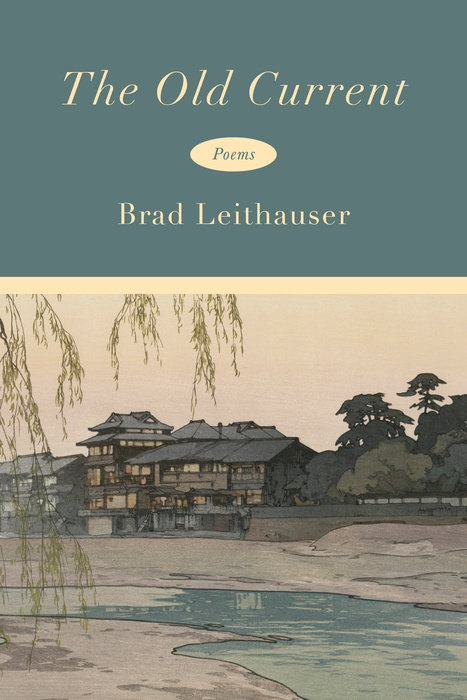This month we welcome back TC stalwart BRAD LEITHAUSER, who honors us with new work, including the title poem of his new collection from Knopf, The Old Current.
—John Hennesy

ABOUT THE OLD CURRENT
MacArthur Fellowship–winning poet Brad Leithauser returns with his first new collection in more than a decade, a collection that recalls the delicacy and intimacy of his early, award-winning volumes, and embraces the wisdom of age.
As snappy as a dinner jacket’s red silk lining, as appealing as a piano interlude in jazz, Brad Leithauser’s robust felicity is a balm in grim times. It’s also the perfect vehicle for nostalgia, regret, and surprise, forces that animate his first collection in more than a decade. By turns laugh-out-loud funny and deeply thoughtful, this collection balances wisdom and practicality, as with deft care Leithauser easily, often unexpectedly, juggles off-rhymes and old forms and new.
—From the publisher
Table of Contents:
- “Old Current”
- “Return to Japan”
- “Words Turn Back”
The Old Current
A gritty bench, a grubby river,
And an ongoing wave of wonderment:
How capable and amazing
Everything is, such people are,
Routinely erecting their
Rare dwellings here, with blazing
Blue pantiled roofs, fitted under a hot
And hazy ring of hills.
…So firmly rooted, yet so
Remote from me and a narrow,
Open-plotted upbringing
On a tucked away
Plain in southeast Michigan,
Even as, right here, they
Fashioned their unfigured lives,
Equally at home, equally tucked away.
I’m twenty-seven, maybe too old to be
Upended by this, the manifold
Foreignness of it all, the fulfilling
Queer grandeur of it all,
But we each come into ourselves
As each can, in our own
Unmetered time (our own sweet way),
And for me this day’s more thrilling
Than, even now, I can express:
A Michigan boy, plunked down
In Japan—Kyoto, no less—
In the sun, on a bench, by a river.
To my adopted bench I’ve brought
A lunch all but miraculous
Even if bought
In a minimart much like
Any such shop back home.
Outfitted with free chopsticks
I can’t manipulate,
My first lunch in Japan consists
Of utterly raw fish,
And a minnowy plastic fish
Whose mouth squirts soy sauce,
And a translucent slice
Of pickled ginger, and a bed of rice,
Still cool (though my hands are sweaty),
Festooned with airy strips
Of dried seaweed,
like confetti,
And nearly forty years later
An exhausted plate of maguro
And unagi in a dive near Penn Station
Reawakes the past, the repast…
The seaweed is what does it.
The color does it (wine-dark,
The very hue wine would take
If wine were green),
Or the texture (dry but slippery),
Or its pungent distant scent
(Sun-blasted tidal flats,
Evaporated seas).
I’m sixty-six, and could anything
Reliably be more heartening
Than stray hints that life’s brightest events
Are, however far-flung, strung
Along a long old current? Than the presentiment
Of some vast, unglimpsed waterway
Where past and present
Dissolve in an enduring flux?
Dexterous chopsticks lift a block of maki
To my nose, as a here-and-now fades
And I’m closer than in decades
To our young man by the Kamo River.
It was a day in August. It was hot,
And I’d come to an ancient city
To contemplate a sun-splashed river
And an embaying ring of hills.
There are moments, slippery
And salvific, rare and pure
And paradoxical as old current,
When the wine turns green.
There are these moments,
A verdant vintage goes
To your head, unclouding a passage
Beyond this one on
A river that, having carried
Cargoes past human reckoning, invites
A further passenger. The lights
Shall be borne. And you be ferried.
RETURN TO JAPAN
KANAZAWA
Dusk, clear skies, and rain
Ringing and ringing the pond—
No, water-striders—
While the snowy hills
Turn pink before turning white
Once more in the dark.
TOKYO, 5 A.M.
Stripped moon, hung over
The Ginza, and one drowsing
Sun, nudged by neon;
Stars in a which-ways
Of wholesale abandonment—
Half lit, half-hearted.
KYOTO
On a steep mountain
Path, too narrow for two, you
Meet your younger self.
Words Turn Back
We had a parting of the ways, some ways back.
—Or perhaps more accurate to say
You halted and we kept going. The outcome,
Come what will, is a widening divide, each day
Drawing us precisely one further day apart, each
New event—indifferent or passionate,
Blissful, blighted—becoming a little puzzle-piece
We’ve fitted into our lives and you have not.
The living move on—there is no other way—
And yet our words turn back,
And often we most meaningfully speak
Over the shoulder.
We hike a well-worn track
Of unfixed origin, and if we live
Prospectively—no other way—we live for the small
Intermissions as well, when words turn back
Into the substances we’d recall,
Where to utter your name again
Is to materialize you
Just as once you were, and to be
Re-reminded, while you vanish anew,
How we brave the same obstacles and come,
Seasonably, to the same recognition
Of a reviving uncertainty: our unreckonable
But identical destination.
Poet, novelist, essayist, Brad Leithauser is the author of eighteen books, the most recent of which is Rhyme’s Rooms: The Architecture of Poetry. His nineteenth, The Old Current, a collection of poems, will be published by Knopf in February. He is a former theater critic for Time, and the recipient of numerous awards and honors, including a MacArthur Fellowship and a Guggenheim Fellowship. In 2005, he was inducted into the Order of the Falcon by the president of Iceland. A former professor in the Writing Seminars at Johns Hopkins University, he lives in Amherst, Massachusetts



